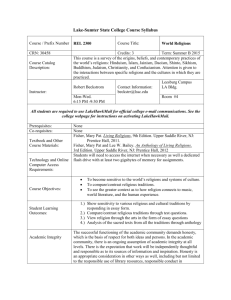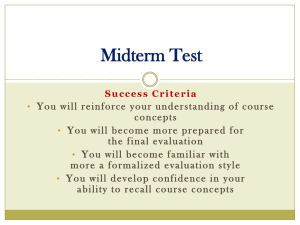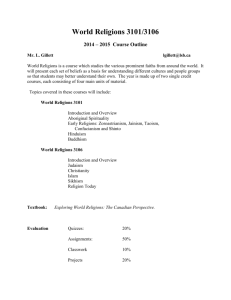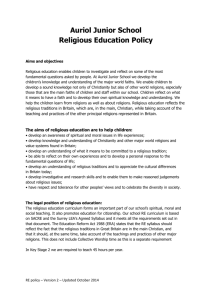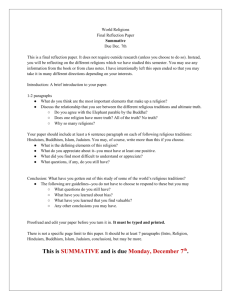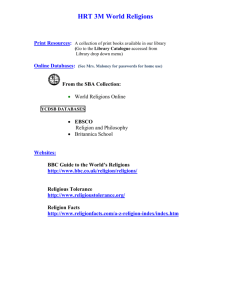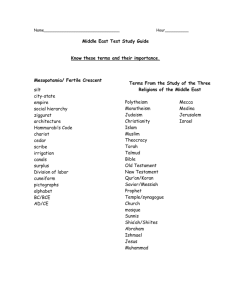Fall 2015 SL Syllabus World Religions - Lake
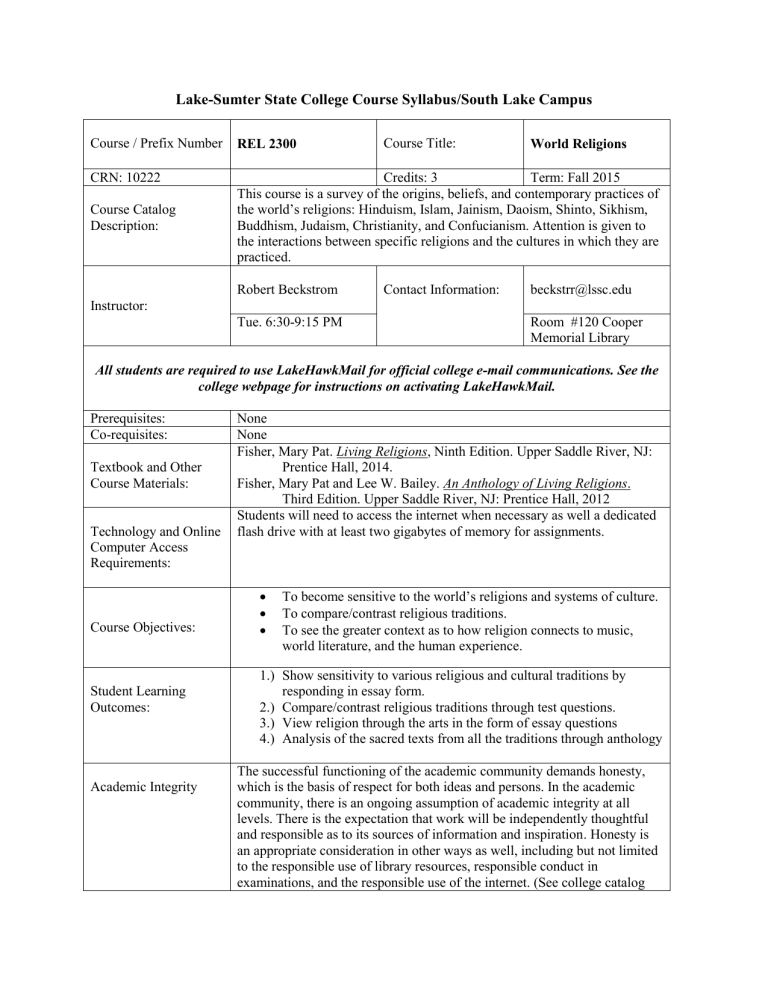
Lake-Sumter State College Course Syllabus/South Lake Campus
Course / Prefix Number REL 2300 Course Title: World Religions
CRN: 10222
Course Catalog
Description:
Instructor:
Credits: 3 Term: Fall 2015
This course is a survey of the origins, beliefs, and contemporary practices of the world’s religions: Hinduism, Islam, Jainism, Daoism, Shinto, Sikhism,
Buddhism, Judaism, Christianity, and Confucianism. Attention is given to the interactions between specific religions and the cultures in which they are practiced.
Robert Beckstrom beckstrr@lssc.edu Contact Information:
Tue. 6:30-9:15 PM Room #120 Cooper
Memorial Library
All students are required to use LakeHawkMail for official college e-mail communications. See the college webpage for instructions on activating LakeHawkMail.
Prerequisites:
Co-requisites:
None
None
Textbook and Other
Course Materials:
Fisher, Mary Pat. Living Religions
Prentice Hall, 2014.
, Ninth Edition. Upper Saddle River, NJ:
Fisher, Mary Pat and Lee W. Bailey. An Anthology of Living Religions
Third Edition. Upper Saddle River, NJ: Prentice Hall, 2012
.
Students will need to access the internet when necessary as well a dedicated flash drive with at least two gigabytes of memory for assignments. Technology and Online
Computer Access
Requirements:
Course Objectives:
To become sensitive to the world’s religions and systems of culture.
To compare/contrast religious traditions.
To see the greater context as to how religion connects to music, world literature, and the human experience.
Student Learning
Outcomes:
1.) Show sensitivity to various religious and cultural traditions by responding in essay form.
2.) Compare/contrast religious traditions through test questions.
3.) View religion through the arts in the form of essay questions
4.) Analysis of the sacred texts from all the traditions through anthology
Academic Integrity
The successful functioning of the academic community demands honesty, which is the basis of respect for both ideas and persons. In the academic community, there is an ongoing assumption of academic integrity at all levels. There is the expectation that work will be independently thoughtful and responsible as to its sources of information and inspiration. Honesty is an appropriate consideration in other ways as well, including but not limited to the responsible use of library resources, responsible conduct in examinations, and the responsible use of the internet. (See college catalog
Important Information for Students with
Disabilities for complete statement.)
Any student with a documented disability who requires assistance or academic accommodations should contact the Office for Students with
Disabilities immediately to discuss eligibility. The Office for Students with
Disabilities (OSD) is located on the Leesburg Campus, but arrangements can be made to meet with a student on any campus. An appointment can be made by calling 352-365-3589 and specific information about the OSD and potential services can be found at www.lssc.edu
, the go to “Quick Links” and click on Disability Services.
Private Policy
(FERPA):
Attendance/Withdrawal
Policies:
The Family Educational Rights and Privacy Act (FERPA) (20 U.S.C. §
1232G; 34 CFR Part99) is a Federal Law that protects the privacy of a student’s education records. In order for your information to be released, a form must be signed and in your records located in Admissions/Registrar’s
Office.
If for any reason a student decides to discontinue class attendance, it is that student’s responsibility to withdraw from class prior to the deadline date published in the catalog. Failure to withdraw properly from class will result in a grade of F for the class.
Regular attendance in class is required. If a student misses more than three class meeting student will receive a failing grade.
Withdrawal Deadline: Mon. 11/2/2015
Course Schedule
Week #1 8/25
Introductions/syllabus review
Course Expectations
Chapter #1, Religious Responses
Week #2 9/01
Chapter #2, Indigenous Sacred Ways
Research project sign up
Religion paper/ideas
Week #3 9/08
Chapter #3, Hinduism
Week # 4 9/15
Chapter #4, Jainism
Week # 5 9/22
Chapter #5, Buddhism
Test #1
Week #6, 9/29
Anthology work
Chapter #6, Daoism and Confucianism
Week # 7 10/6
Chapter #7, Shintoism and Zoroastrianism
Week # 8 10/13
Judaism #8
Week # 9 10/20
Chapter #9, Christianity
Anthology work
Week # 10 10/27
Chapter #10, Islam
Test #2
Week #11 11/3
Chapter #11, Sikhism
Research Projects
Visits to a religious house/observe the liturgy
Week # 12 11/10
Anthology
Class Presentations
Week # 13 11/17
Chapter# 12, New Religious Movements
Religions in the 21 st Century
Anthology #3
Class Presentations
Paper due
Test #3
Week #14, 11/24
Religion in the future
Chapters #13/#14/#15
Religion /Materialism
Chapter #13 Continued
Religion and materialism/Religion and the future of humanity
Week #15 12/01
Week # 16 12/8
Final Exam
Methods of Evaluation Class Presentation 10%
Written Paper 15%
3 Tests 15% each
Final Exam 30%
Grading Scale 90 to 100 equals A
80 to 89 equals B
70 to 79 equals C
60 to 69 equals D
0 to 59 equals F
Classroom Rules and
Policies
All missed work must be made up as soon as possible.
Tests may not be taken after the date they are administered, unless prior
Violence Statement:
Syllabus Disclaimer: arrangements have been made with the instructor.
No cell phones in use during class sessions.
Lake-Sumter State College has a policy of zero tolerance for violence as stated in College Board Rule 2.17. Appropriate disciplinary action will be taken in accordance with Board Rule 2.17.
The information in this syllabus, to the best of my knowledge, is correct and complete. The instructor acting within policies and procedures of Lake-
Sumter State College, reserves the right to make necessary changes to any course content.
